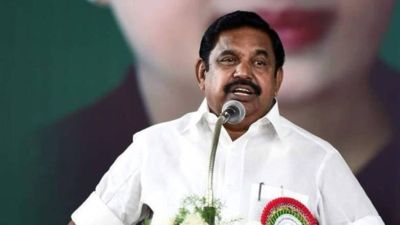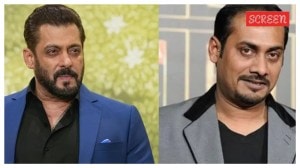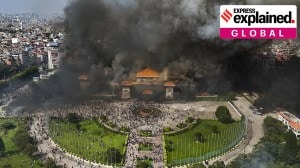Shubhajit Roy, Diplomatic Editor at The Indian Express, has been a journalist for more than 25 years now. Roy joined The Indian Express in October 2003 and has been reporting on foreign affairs for more than 17 years now. Based in Delhi, he has also led the National government and political bureau at The Indian Express in Delhi — a team of reporters who cover the national government and politics for the newspaper. He has got the Ramnath Goenka Journalism award for Excellence in Journalism ‘2016. He got this award for his coverage of the Holey Bakery attack in Dhaka and its aftermath. He also got the IIMCAA Award for the Journalist of the Year, 2022, (Jury’s special mention) for his coverage of the fall of Kabul in August 2021 — he was one of the few Indian journalists in Kabul and the only mainstream newspaper to have covered the Taliban’s capture of power in mid-August, 2021. ... Read More
Sisi’s visit as Republic Day chief guest: India’s Egypt opportunity
Relations between the two countries have been historically good. India sees Egypt as a moderate, friendly voice in the Islamic world, and their relationship has now been elevated to a strategic partnership. New opportunities lie ahead for the two Global South partners.
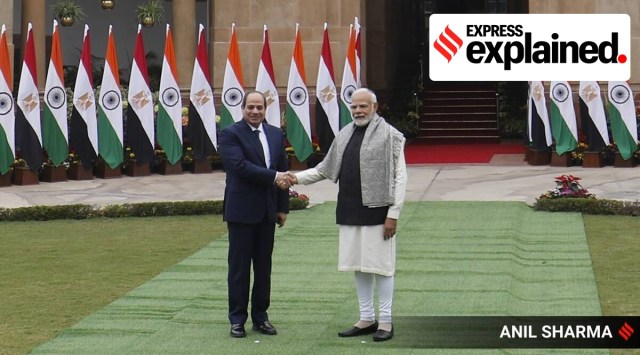 Prime Minister Narendra Modi with Egyptian President Abdel Fattah El-Sisi before meeting at Hyderabad House in New Delhi on Wednesday. (Express photo by Anil Sharma)
Prime Minister Narendra Modi with Egyptian President Abdel Fattah El-Sisi before meeting at Hyderabad House in New Delhi on Wednesday. (Express photo by Anil Sharma)
Prime Minister Narendra Modi and President Abdel Fattah El-Sisi on Wednesday agreed to elevate the India-Egypt bilateral relationship to a “strategic partnership”.
The strategic partnership will have broadly four elements: political, defence, and security; economic engagement; scientific and academic collaboration; cultural and people-to-people contacts.
Sisi is the Chief Guest at this year’s Republic Day, the first time that an Egyptian President has been accorded this honour. A military contingent from Egypt participated in the parade on Thursday.
Sisi is the fifth leader from the region of West Asia and North Africa to be the Republic Day Chief Guest, after Algeria’s President Abdelaziz Bouteflika (2001), Iran’s President Mohammed Khatami (2003), King Abdullah bin Abdulaziz al-Saud of of Saudi Arabia (2006), and the Crown Prince — now President and ruler — of the UAE, Mohammed bin Zayed Al Nahyan (2017).
An invitation to be Chief Guest is an important honour that is very high on symbolism. New Delhi’s choice of Chief Guest every year is dictated by a number of reasons — strategic and diplomatic, business interest, and geopolitics.
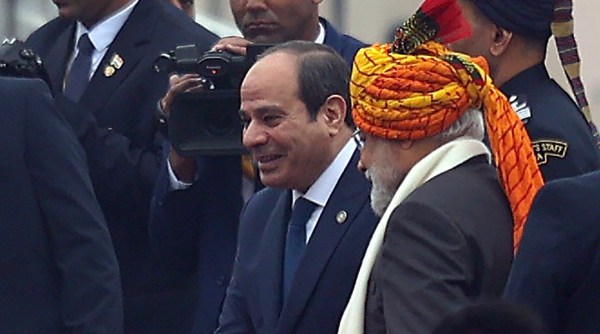
An old, shared history
The history of contacts between India and Egypt, two of the world’s oldest civilisations, can be traced back to at least the time of Emperor Asoka. In modern times, Mahatma Gandhi and the Egyptian revolutionary Saad Zaghloul shared common goals on independence from British colonial rule, and the two nations made a joint announcement of establishment of diplomatic relations at the ambassadorial level three days after India became free.
Prime Minister Jawaharlal Nehru was a close friend of President Gamal Abdel Nasser, and India and Egypt signed a friendship treaty in 1955. In 1961, Nehru and Nasser, along with Yugoslavia’s President Josip Broz Tito, Indonesia’s President Sukarno. and Ghana’s President Kwame Nkrumah, established the Non-Aligned Movement (NAM).
Prime Ministers Rajiv Gandhi, P V Narasimha Rao, I K Gujral, and Dr Manmohan Singh visited Egypt in 1985, 1995, 1997, and 2009 (NAM Summit) respectively, and Egypt’s President Hosni Mubarak came to India in 1982, 1983 (NAM Summit), and 2008. After the 2011 revolution, President Mohamed Morsi visited India in March 2013.
Relationship since 2014
President Sisi was part of the coup d’état in which Morsi was ousted. In 2014, then Field Marshal Sisi — a former military chief — contested elections against a lone opponent and won with 97 per cent votes in his favour. External Affairs Minister Sushma Swaraj visited Cairo in August 2015, a little over a year after Sisi took charge in June 2014.
Prime Minister Modi met Sisi on the sidelines of the United Nations General Assembly in September 2015, and the Egyptian leader paid a State visit to India in September 2016. The joint statement identified political-security cooperation, economic engagement and scientific collaboration, and cultural and people-people ties as the basis of a new partnership for a new era.
This is Sisi’s third visit to India; Modi’s planned visit to Egypt in 2020 was disrupted by the Covid-19 pandemic. The two leaders spoke by phone in April that year to discuss efforts to halt the spread of the virus, and again to exchange Eid-ul-Fitr greetings. Sisi expressed sympathy and solidarity with the Indian people and government during the deadly second wave in April-May 2021, and Egypt sent medical supplies to India.
Friend in Muslim world
As home to the great university of Al Azhar, widely seen as the most respected seat of learning for Sunni Islam, Egypt has a special place in the Islamic world. Al Azhar is where President Barack Obama made his famous “A new beginning” speech, his outreach to the Muslim world, in 2009.
New Delhi views Sisi’s Egypt as a moderate Islamic voice among Muslim-majority countries, as well as a “friend” within the Organisation of Islamic Cooperation (OIC), the 57-country grouping of Islamic nations that routinely issues statements condemning India’s policy in Jammu & Kashmir and the situation of Muslims in the country, at Pakistan’s behest.
An important indication of Egypt’s evolved understanding of India’s situation came in June 2022 when the government in Cairo declined to join at least 15 other countries to condemn former BJP spokesperson Nupur Sharma’s remarks on the Prophet.
Tough on terrorism
From the beginning, Sisi has been tough on Islamic religious extremism — critics say he saw advantage in positioning himself against the Muslim Brotherhood whose leader, Morsi, had been jailed — and has earned praise for his fight.
On Wednesday, with President Sisi by his side, Prime Minister Modi said India and Egypt were “worried about the spread of terrorism around the world”, and were “unanimous” that terrorism is the “most serious security threat” to humanity. The two countries agreed that “concerted action is necessary to end cross-border terrorism”, Modi said.
Sisi said India and Egypt shared a “common perspective”, and that the spread of violence, terrorism, and extremist ideology presented a serious threat to not only their two countries, but to all the countries of the world.
With Sisi, a former military chief and defence minister of Egypt at the helm, the two countries are looking at deepening defence and security cooperation. The two Air Forces collaborated on the development of fighter aircraft in the 1960s, and Indian pilots trained their Egyptian counterparts from the 1960s until the mid-1980s. Both the IAF and Egyptian air force fly the French Rafale fighter jets.
New Delhi wants to supply India-made defence equipment such as the LCA Tejas, missiles like Akash, DRDO’s Smart Anti-Airfield Weapon, and radars to Egypt. A pact was signed when Defence Minister Rajnath Singh visited Cairo last year, and the two countries have decided to also participate in exercises and cooperate in training.
Difficult time for Egypt
Egypt’s economy has been in shambles over the past few years. It was battered by the collapse of tourism during the pandemic, and the Russia-Ukraine war has impacted its supply of food — almost 80% of Egypt’s grain came from these two countries — and hit its foreign exchange reserves. Despite restrictions on the export of wheat, India had last year allowed shipments of 61,500 metric tonnes to Egypt. But the country needs more.
Inflation is at a five-year high of 21 per cent. Egypt has approached the International Monetary Fund (IMF) for the fourth time in six years for a bailout. It received a $12 billion IMF loan in 2016, and has also got budgetary support of about $8 billion from Saudi Arabia and the UAE.
From India, Egypt has sought investments in infrastructure — Metro projects in Cairo and Alexandria, a Suez Canal economic zone, a second channel of the Suez Canal, and a new administrative capital in a Cairo suburb. More than 50 Indian companies have invested more than $3.15 billion in Egypt.
Geo-strategic concerns
China’s bilateral trade with Egypt is currently at $15 billion, double that of India’s $7.26 billion in 2021-22. Sisi has been wooing Chinese investments, and has travelled to China as many as seven times in the last eight years.
Egypt, the most populous country in West Asia, occupies a crucial geo-strategic location — 12% of global trade passes through the Suez Canal — and is a key player in the region. It is a major market for India and can act as a gateway to both Europe and Africa. It also has bilateral trade pacts with important West Asian and African nations.
More than six decades ago, the two countries founded the NAM. They now have an opportunity to forge a new path ahead, not just for their strategic and economic interests, but as the voice of the Global South.
Photos



- 01
- 02
- 03
- 04
- 05


